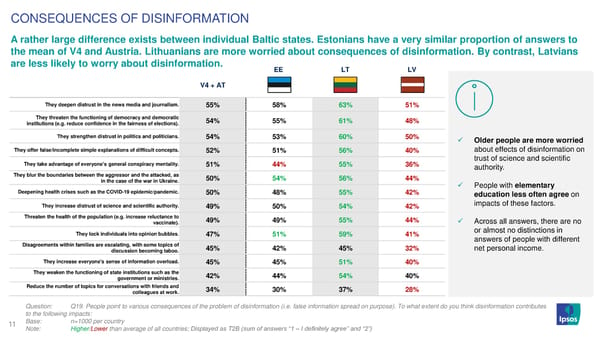CONSEQUENCES OF DISINFORMATION A rather large difference exists between individual Baltic states. Estonians have a very similar proportion of answers to the mean of V4 and Austria. Lithuanians are more worried about consequences of disinformation. By contrast, Latvians are less likely to worry about disinformation. EE LT LV V4 + AT They deepen distrust in the news media and journalism. 55% 58% 63% 51% They threaten the functioning of democracy and democratic 54% 55% 61% 48% institutions (e.g. reduce confidence in the fairness of elections). They strengthen distrust in politics and politicians. 54% 53% 60% 50% ✓ Older people are more worried They offer false/incomplete simple explanations of difficult concepts. 52% 51% 56% 40% about effects of disinformation on They take advantage of everyone's general conspiracy mentality. 51% 44% 55% 36% trust of science and scientific authority. They blur the boundaries between the aggressor and the attacked, as 50% 54% 56% 44% in the case of the war in Ukraine. ✓ People with elementary Deepening health crises such as the COVID-19 epidemic/pandemic. 50% 48% 55% 42% education less often agree on They increase distrust of science and scientific authority. 49% 50% 54% 42% impacts of these factors. Threaten the health of the population (e.g. increase reluctance to 49% 49% 55% 44% ✓ Across all answers, there are no vaccinate). They lock individuals into opinion bubbles. 47% 51% 59% 41% or almost no distinctions in Disagreements within families are escalating, with some topics of answers of people with different discussion becoming taboo. 45% 42% 45% 32% net personal income. They increase everyone's sense of information overload. 45% 45% 51% 40% They weaken the functioning of state institutions such as the 42% 44% 54% 40% government or ministries. Reduce the number of topics for conversations with friends and 34% 30% 37% 28% colleagues at work. Question: Q19. People point to various consequences of the problem of disinformation (i.e. false information spread on purpose). To what extent do you think disinformation contributes to the following impacts: Base: n=1000 per country 11 Note: Higher/Lower than average of all countries; Displayed as T2B (sum of answers “1 – I definitely agree” and “2”)
 Perceptions of information chaos in Baltic states and Central Europe Page 10 Page 12
Perceptions of information chaos in Baltic states and Central Europe Page 10 Page 12